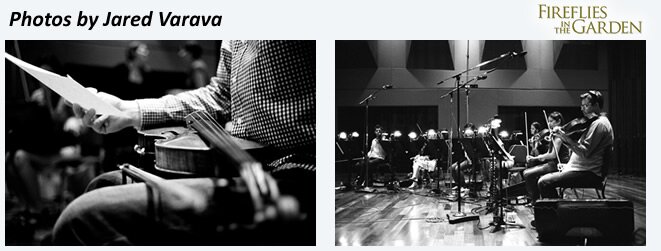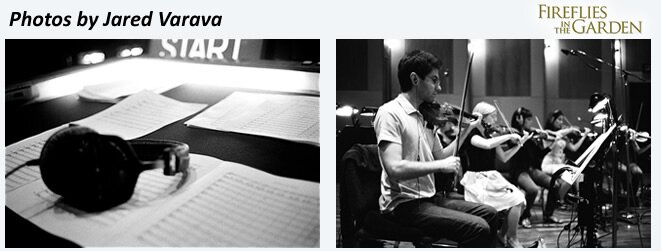| ScoreNotes: Can you tell us about the trajectory of Fireflies in the Garden, including when you worked on the film, and to the best of your knowledge, how it eventually garnered a theatrical release date in the U.S.? |
| Jane Antonia: It was a very quick process; I was hired in July and delivered the score in August. As I was finishing up the score for a film called Highland Park, I received an email from its cinematographer, Danny Moder. He was producing another film, Fireflies in the Garden, and asked if I?d like to chat with the director, Dennis Lee, about composing the score. After meeting with Dennis and the producers, I saw the film and thought it was beautiful. Composers tend to be brought into projects late, at the end of post-production. This was the case with Fireflies as well; so the US theatrical release had already been secured by the time I was brought on board. |
| |
 |
| |
| ScoreNotes: What are some of the creative challenges a composer faces when dealing with such deeply emotional subject matters like with Fireflies in the Garden? I?d imagine conveying a ?sense of loss? is a delicate balancing act. |
| Jane Antonia: Absolutely. In a film like this, it?s important to be sensitive to the dialogue and the picture, and not overwhelm either. When Dennis and I sat down and spotted the film, he told me he was looking for something that was deeply expressive but that contained moments of levity. As I watched the movie I noticed that there are intense moments without much ambient sound or dialogue where I could really go to town. Then there are intimate moments where very little score enhances the scene just enough. I think that choosing the correct instrumentation helps as well. I had some incredible world-class soloists play on the score. |
| |
| ScoreNotes: How impressed were you by the cast of this film and in what way did the superlative performances inform your score? |
| Jane Antonia: It?s a pretty amazing cast, isn?t it! It was easy to be inspired by the incredible performances, which made the scoring process really enjoyable. Many scenes spring to mind as examples, but I remember in particular scoring a scene between a furious Charles, (Willem Dafoe) and his distressed young son (Cayden Boyd). I mirrored the heightened emotion in that spot with a really virtuosic tempestuous violin solo, followed by a loud (fff!), dissonant low piano chord. As I said before, scenes like this really gave me creative freedom. |
| |
| ScoreNotes: When working on a film project, how consuming does it become for a composer? I have often heard that respites are few and far between and I?d love to hear how you balance the daunting workload. |
| Jane Antonia: I think I tend to work quickly and stick with my initial ideas and gut feelings from watching the picture, and I feel very lucky to be able to work this way. On this project, I chose to write out all the scores and parts myself because I had specific ideas about how the score should be presented. So that was the time consuming part, as it was very technical and labor intensive. |
| |
 |
| |
| ScoreNotes: How helpful is a score like Fireflies in the Garden for your career, and do you have any concerns that you may be greeted with a deluge of projects that fall into the Drama category? The price of success, it seems, comes with a composer being asked to work in the same genre on repeat occasions. |
| Jane Antonia: I have no problem with the idea of being deluged with dramas, providing they?re in this league! Fireflies is such a good film, with such an outstanding cast that I?m sure it will lead to more great opportunities. Again, I was very lucky with this project ? the director pretty much gave me free rein to go in the direction I wanted, while giving great feedback. |
| |
| ScoreNotes: A broader question ? what first compelled you to embark on a career in film composing? |
| Jane Antonia: My decision came when I was around 19 years old and studying composition at the Royal Northern College of Music in the UK. It was a combination of discovering some incredible movie scores, like the score to Ran by Tôru Takemitsu, and wanting to apply music to other art forms. |
| |
| ScoreNotes: When you look back on it, would you say your score for Island of Lost Souls helped establish you on the scoring scene? The film music journalists across the globe had nothing but positive remarks for your work! |
| Jane Antonia: I was thrilled that the reviews were so positive. It was great that the film came along when it did. It was such an epic production. The director, Nikolaj Arcel encouraged me to really push the boundaries and write this huge, powerful 90-minute score. To top it off, the score was recorded by a superb 100-piece orchestra and choir and released on a soundtrack album. I was lucky to have that score as my calling card so early on in my career. |
| |
| ScoreNotes: How rewarding was it to have won a British Academy Award so early in your career? |
| Jane Antonia: Very! It was for my first film score, so I wasn?t expecting it at all. |
| |
| ScoreNotes: Can you tell us about your work as an orchestrator and how that aspect of the craft helps better you as a composer? |
| Jane Antonia: As much as I enjoyed the experiences I?ve had orchestrating, it?s a technical job, for the most part, so for me it?s very separate from composing. What helps my composing is constantly wanting to write new music ? when I?m not scoring a movie I write concert music, which really does give me carte blanche to write whatever I want, to push boundaries and develop my sound. |
| |
| ScoreNotes: What has you the most enthused as you look toward your future in this industry? |
| Jane Antonia: If opportunities like Fireflies in the Garden continue to present themselves, I?ll be more than delighted. I?d like to continue to collaborate with huge talents as well as compose music that I?m proud of writing. |
| |
| VISIT JANE'S OFFICIAL WEB SITE AT THIS ADDRESS: http://janeantoniacornish.com |
